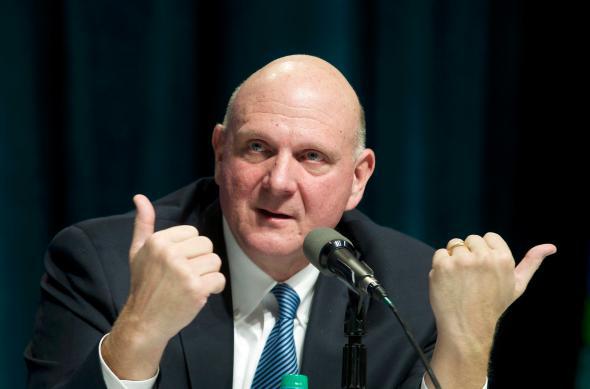Former Microsoft CEO Steve “Monkey Boy” Ballmer is paying $2 billion to purchase the Los Angeles Clippers away from the Sterling family. But the fire sale has quickly led to another sort of controversy. How on earth could a single NBA franchise—one that doesn’t even own an arena—be worth that kind of money?
The answer might well be that it’s not, at least if you’re talking strictly in terms of profits. Instead, we may well be looking at an example of the dreaded phenomenon known as “the winner’s curse.”
Economists have long noted that in auctions for investments like land rights, which have an actual dollar value that one can calculate, the winners often overpay. The reason for this is simple. In an auction, the highest bidder wins. And the higher someone bids, the more likely it is they have overestimated the worth of whatever they are trying to buy. If 10 companies are competing for the mineral rights to a piece of North Dakota’s oil patch, whoever has the most Pollyanna-ish projections about tomorrow’s crude prices and recovery rates is probably going to come away the winner. But if the oil doesn’t flow as expected, then he ends up the loser. Hence, the winner’s curse.
The more uncertainty there is over an asset’s true value, the more danger there is of overbidding.
The sale of the Clippers was much like a public auction. There wasn’t a sharply dressed guy waving a gavel around, but thanks to the NBA’s move to strip Donald Sterling of his team, it was clear that the franchise was up for grabs, which attracted a number of wealthy potential investors, including one group that included spectacularly rich Oracle CEO Larry Ellison, Oprah Winfrey, and entertainment mogul David Geffen. Ballmer, who has a personal fortune estimated around $20 billion, reportedly outbid them by $400 million. To put that in perspective: The last NBA teams sold, the Milwaukee Bucks and Sacramento Kings, went for $550 million and $534 million, respectively. The Philadelphia 76ers, which like the Clippers rent their venue, went for a reported $280 million in 2011.
There are reasons to be optimistic about the long-term value of an NBA franchise in 2014, which Kurt Badenhausen at Forbes ran down neatly yesterday. Thanks to the negotiations that ended the 2011 lockout, players earn less as a proportion of NBA revenue than they used to, and there’s more profit-sharing between teams, meaning it’s close to impossible to lose money in the league these days. The value of live sports on television has skyrocketed, since it’s one of the few things that viewers don’t want to DVR, and the Clippers are close to renegotiating their own local TV deal, which will likely bring in billions. And Los Angeles is a huge market that happens to lack an NFL franchise, which leaves more oxygen around for other sports teams. It also doesn’t hurt that interest rates are low, and that owning a franchise might give Ballmer some tax write-offs.
Still, you have to make some very upbeat assumptions to believe that Ballmer will come out of this with a profit. “If you believe in the growth of the league, you believe in the TV rights renewals and you want to be the big guy in L.A., it makes sense,” Rob Tilliss, a sports financial adviser who worked with another Clippers bidder, told the New York Times. “But I can’t make the economic argument for you.”
Which is why I sincerely doubt Ballmer is making this purchase based purely on economics. Sports teams might be more profitable than in the past. But they are also a status symbol for the global ultra-rich—a circle of people that, as you might have heard, has expanded in recent years. A basketball team in L.A. as opposed to Milwaukee is an even gaudier status symbol. In that way, the Clippers are a lot more like a famous Warhol than an oil well. And for Ballmer—a basketball fan who tried and failed to bring the Sacramento Kings to Seattle (which has been without a team since the Sonics left for Oklahoma City in 2008)—the joy of owning his very own team is probably worth far more than whatever the returns on that team could add to his vast personal fortune. His bid might be cursed. But he probably doesn’t care.
